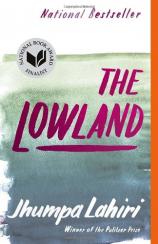The Lowland
Review
The Lowland
For most of her justly celebrated career, Jhumpa Lahiri has written about the tensions and cultural differences in marriages between Westerners and people of Indian ancestry. With her rare talent for the telling detail and her leisurely, old-fashioned approach to storytelling, Lahiri has produced some of the most compelling fiction of the past 15 years. Her two story collections, INTERPRETER OF MALADIES and UNACCUSTOMED EARTH, are masterpieces of the short form. In her second novel, THE LOWLAND, she gives us another family saga, this time with the addition of political intrigue and its effect on a Calcutta family.
Subhash and Udayan Mitra are brothers born just before the 1947 Partition of Britain’s Indian Empire. Subhash is the older and quieter of the two, an introverted child who enjoys watching his mother embroider saris and likes to cup his hands in pond water to search for frogs. Udayan is more daring, the brother who suggests breaking into the Tolly Club to hit golf balls on the sly and whose mischief makes him stumble onto a freshly paved courtyard path before the concrete has set. They grow up near “a lowland spanning a few acres,” past which they walk whenever they run to a nearby field to play football.
Each brother is eventually accepted into one of Calcutta’s most prestigious colleges, Udayan to study physics and Subhash chemical engineering. They are headed toward stellar academic careers when a peasant’s revolt in the town of Naxalbari occurs in 1967. A sharecropper tries to plow land from which he is illegally evicted. The landowner has him beaten, and the police won’t intervene. Sharecroppers start to retaliate. This incident is the catalyst for the Naxalite movement, a Communist uprising with the backing of Peking.
"...one of the most beautiful novels I have ever read. To reveal the details of the plot would spoil the pleasure, but Lahiri fans shouldn’t be surprised to learn that the novel is packed with beautiful, deceptively simple sentences and perceptive observations about American life."
Udayan becomes involved in the movement. He begins listening to Radio Peking. He drops out of his graduate program and gets a job teaching science at an Indian technical high school, all while attending Naxalite meetings and painting posters in support of Chairman Mao that read, “Our path is the path of Naxalbari!” Subhash, meanwhile, accepts entry into a doctoral program in the United States.
Subhash’s departure to Rhode Island distresses his family in India, especially Udayan, who misses his brother. But their parents are even more distressed by Udayan’s marriage to a young woman named Gauri, a philosophy student who, in Udayan’s words, “prefers books to jewels and saris.” Theirs was not an arranged union. “Like Chairman Mao, I reject the idea of an arranged marriage,” Udayan writes to Subhash. Udayan and Gauri live with his parents, who are not happy about their daughter-in-law’s presence in their home. The family dynamics eventually change, but not until a tragedy that has repercussions for generations of Mitras.
THE LOWLAND takes a while to get going. After a great opening chapter, the novel gets bogged down in politics and minutiae about the Naxalite movement. Lahiri clearly did her research --- a list of sources is at the back of the book --- but there’s more historical background here than we need. This tendency to over-explain appears elsewhere in the beginning chapters, too. One character spends too much time talking about mergansers, buffleheads and plovers. This is supposed to be idle chat that masks deeper emotions, but the execution succumbs to the imitative fallacy: You don’t need to show long passages of awkward communication to convey a sense of awkwardness.
What a shame it would be, however, if a reader were to stop after these first 50 pages. He or she would miss one of the most beautiful novels I have ever read. To reveal the details of the plot would spoil the pleasure, but Lahiri fans shouldn’t be surprised to learn that the novel is packed with beautiful, deceptively simple sentences and perceptive observations about American life. When an Indian character watches her first news program on American television in the 1970s, she notes, “It was always the news of America, of America’s concerns and activities…There was nothing about Calcutta. What had consumed the city, what had altered the course of her life and shattered it, was not reported here.” The Mitra parents on their sons’ most severe childhood illness: “Even now, when they talk about it, they sound afraid. As if they’re still waiting for our fevers to break.”
Like Lahiri’s story collections, this novel is filled with small touches whose cumulative power leads to an emotionally devastating conclusion. THE LOWLAND is a lovely book.
Reviewed by Michael Magras on November 29, 2013
The Lowland
- Publication Date: June 17, 2014
- Genres: Fiction
- Paperback: 432 pages
- Publisher: Vintage
- ISBN-10: 0307278263
- ISBN-13: 9780307278265




